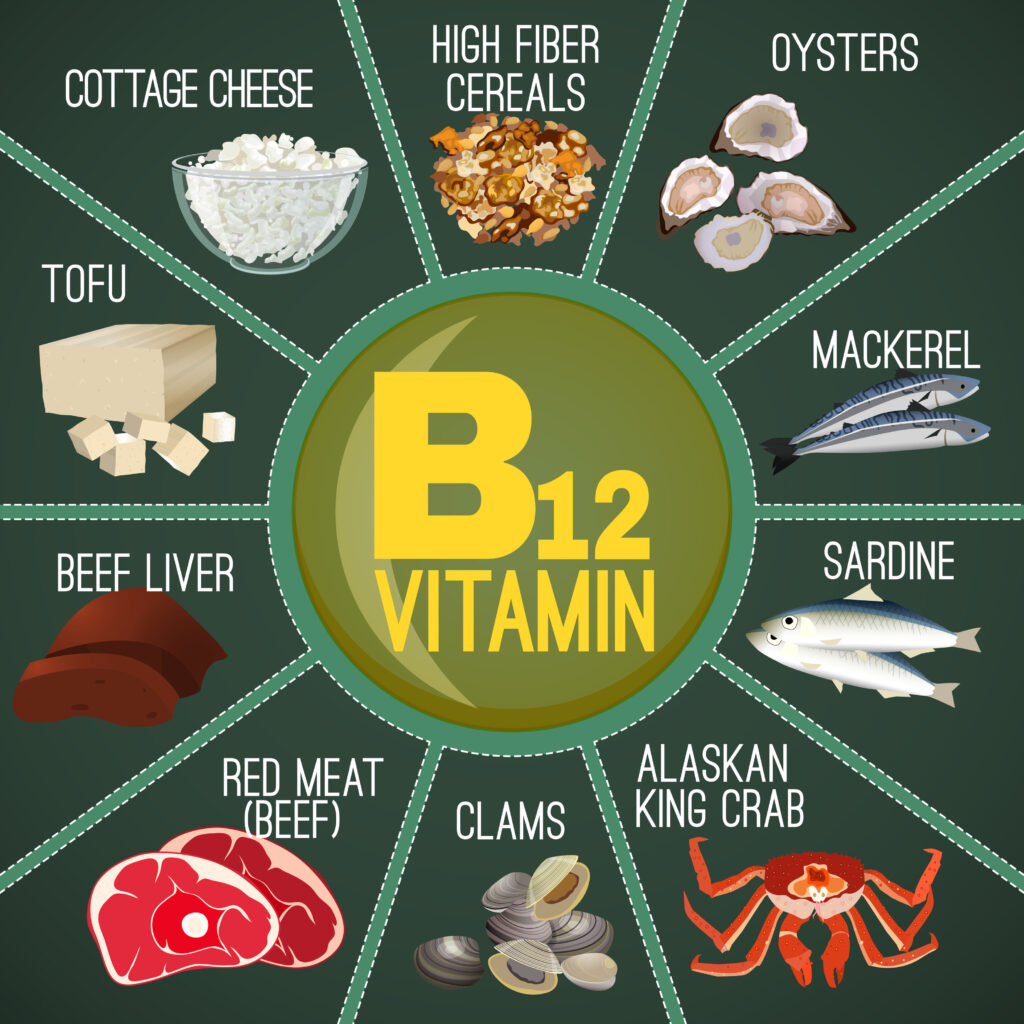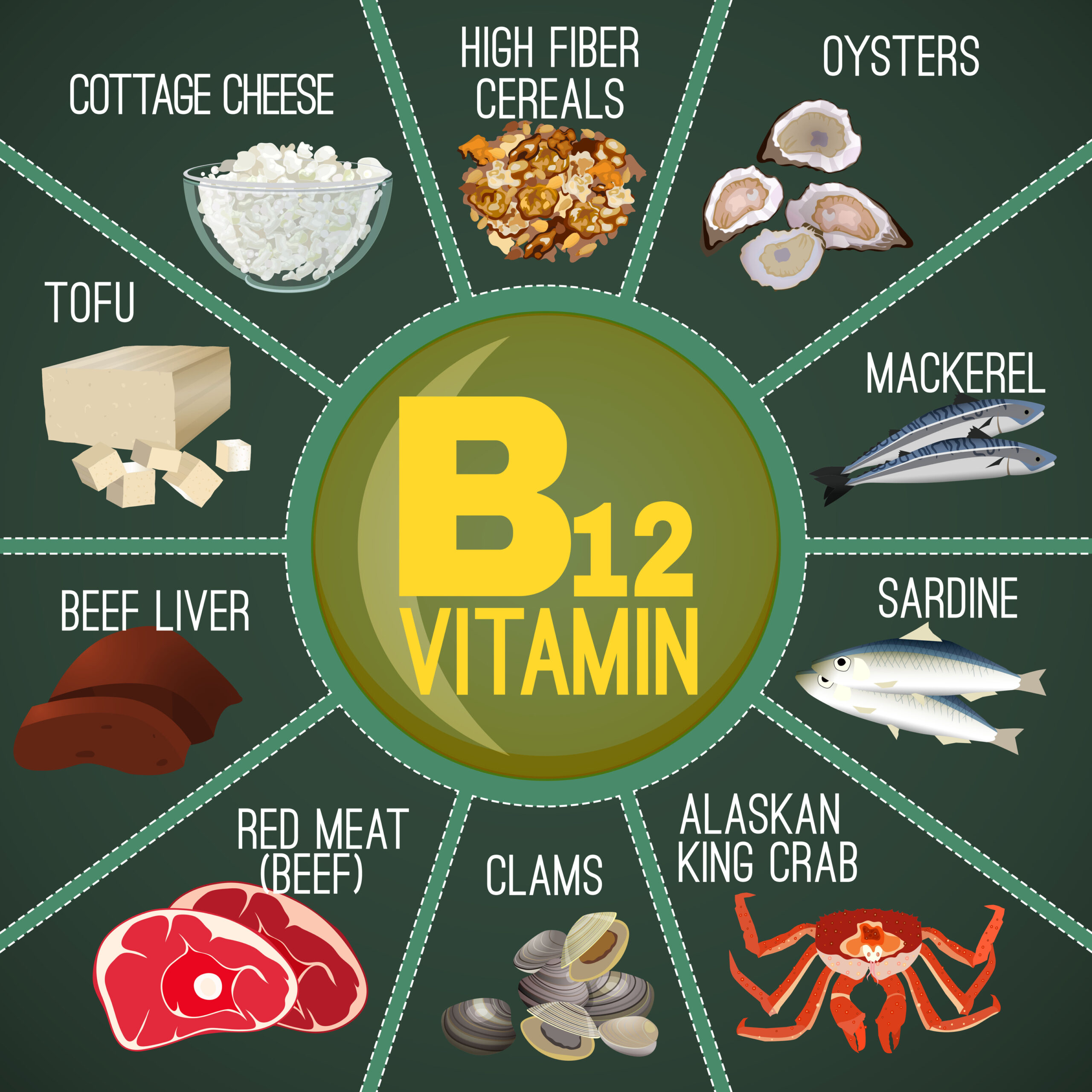Vitamin B12, also known as cobalamin, is an essential water-soluble vitamin that plays a crucial role in various bodily functions. It is one of the eight B vitamins and is unique among them because it contains a cobalt ion at its center, hence the name cobalamin. Vitamin B12 is not produced by plants or animals but is synthesized by certain bacteria, and it is primarily found in animal-based foods.

Vitamin B12 (cobalamin) is considered one of the most important vitamins for human health due to its involvement in several critical bodily functions.
Here are some key reasons why vitamin B12 is essential for overall well-being:
Red Blood Cell Formation: Vitamin B12 is crucial for the synthesis of DNA in red blood cell precursors. Without sufficient B12, red blood cells do not mature properly, leading to megaloblastic anemia. This condition is characterized by enlarged and poorly developed red blood cells, which are not efficient in carrying oxygen throughout the body. Anemia can result in fatigue, weakness, and shortness of breath.
Neurological Function: Vitamin B12 plays a vital role in maintaining a healthy nervous system. It is involved in the formation of the myelin sheath, a protective covering around nerve fibers that allows for efficient nerve impulse transmission. A deficiency in B12 can lead to neurological symptoms like tingling, numbness, and difficulty walking. Severe or prolonged deficiency may cause irreversible nerve damage.
DNA Synthesis and Cell Division: B12 is necessary for DNA synthesis in all cells, contributing to normal cell growth and division. Proper DNA replication is essential for healthy cell function, tissue repair, and growth.
Energy Production: Vitamin B12 is involved in the metabolism of carbohydrates, fats, and proteins, converting these nutrients into energy. Adequate B12 levels support overall energy production and help combat fatigue.
Cardiovascular Health: Some studies suggest that vitamin B12 may help in reducing homocysteine levels in the blood. Elevated homocysteine is associated with an increased risk of heart disease. By helping to regulate homocysteine levels, B12 may contribute to better cardiovascular health.
Cognitive Function: There is growing evidence that maintaining optimal vitamin B12 levels may be linked to better cognitive function, memory, and mental clarity, especially in older adults.
Immune System Support: Adequate vitamin B12 levels are essential for maintaining a healthy immune system, which helps the body defend against infections and illnesses.
Since the body cannot produce vitamin B12, it must be obtained from the diet or supplements. The primary dietary sources of B12 are animal-based foods such as meat, poultry, fish, eggs, and dairy products. Therefore, individuals who follow strict vegan or vegetarian diets are at higher risk of vitamin B12 deficiency and should consider supplementation or consume fortified foods.
In summary, vitamin B12 is crucial for red blood cell formation, neurological function, DNA synthesis, energy production, cardiovascular health, cognitive function, and immune system support. Maintaining adequate levels of vitamin B12 is vital for overall health and well-being. If you suspect a deficiency or have specific health concerns, consult a healthcare professional for proper evaluation and guidance.
Functions of Vitamin B12:
Red blood cell formation: Vitamin B12 is necessary for the synthesis of DNA in red blood cell precursors, which is essential for their proper maturation and function. A deficiency in B12 can lead to megaloblastic anemia, characterized by enlarged and poorly developed red blood cells.
Nervous system function: B12 is involved in the maintenance of the nervous system and the formation of the myelin sheath, which protects nerve fibers and allows efficient nerve impulse transmission. A deficiency in B12 can lead to neurological symptoms like tingling, numbness, and difficulty walking.
DNA synthesis: B12 is required for the synthesis of DNA in all cells, contributing to normal cell growth and division.
Sources of Vitamin B12:
Animal products: The primary dietary sources of vitamin B12 are meat (especially organ meats like liver), poultry, fish, eggs, and dairy products. Certain fortified foods like fortified breakfast cereals and plant-based milk alternatives can also provide B12 for vegetarians and vegans.
Supplements: Vitamin B12 supplements are available in various forms, including oral tablets, sublingual tablets, nasal gels, and injections. These are often recommended for individuals with a deficiency or those who have trouble absorbing B12 from food.
Absorption and Deficiency: Vitamin B12 absorption occurs in the small intestine, where it binds to intrinsic factor (a protein produced in the stomach) and is then absorbed into the bloodstream. Some factors that can lead to vitamin B12 deficiency include:
Inadequate dietary intake: Vegans and vegetarians who do not consume adequate fortified foods or B12 supplements are at risk of deficiency.
Malabsorption issues: Certain medical conditions that affect the stomach (e.g., pernicious anemia) or the small intestine (e.g., Crohn’s disease) can impair B12 absorption.
Age-related decline: As people age, the production of stomach acid and intrinsic factor may decrease, leading to reduced B12 absorption.
Certain medications: Long-term use of certain medications, such as proton pump inhibitors (PPIs) and metformin, may interfere with B12 absorption.
Deficiency Symptoms: Symptoms of vitamin B12 deficiency can include fatigue, weakness, shortness of breath, pale skin, diarrhea, loss of appetite, and neurological symptoms like numbness, tingling, and memory problems.
Treatment and Prevention: Treatment of vitamin B12 deficiency typically involves B12 supplements, either orally or by injection, depending on the severity of the deficiency. To prevent deficiency, it’s essential to consume foods rich in vitamin B12 regularly or consider supplementation if needed.
Overall, vitamin B12 is a vital nutrient for various bodily functions, particularly red blood cell formation and proper nervous system function. If you suspect you have a vitamin B12 deficiency or have specific health concerns, it is essential to consult a healthcare professional for proper evaluation and guidance.
